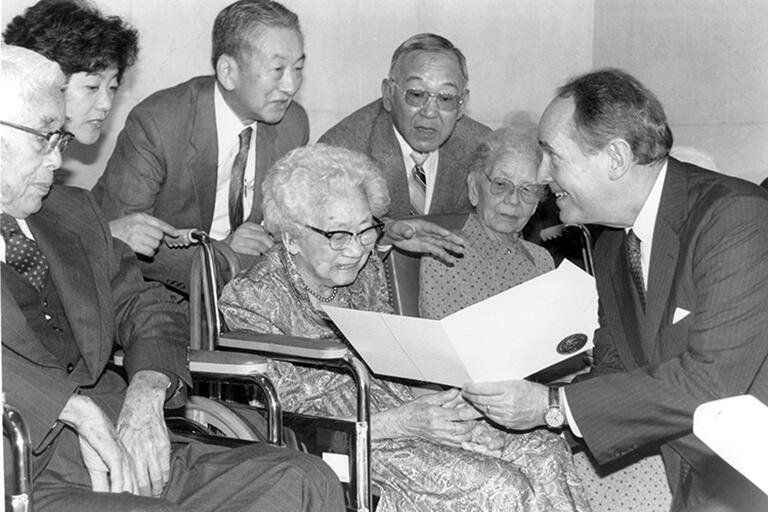Japanese Americans Join the Fight for Reparations
Community Renewal Society (CRS) works every day to become a region free of race and class barriers, a mission that ultimately leads to a Beloved Community where all of God’s children can flourish and prosper. Without the implementation of reparation policies and practices that address the historical legacy of economic injustice, many of God’s children are continuously denied educational, career and life opportunities due to the generational consequences of Jim Crow and redlining. The Japanese American reparations movement serves as an example and inspiration for ongoing efforts to secure reparations for other marginalized communities. It demonstrates that acknowledging and addressing historical injustices is not only possible but also essential for achieving justice and equity. The history of Japanese American reparations can provide valuable insights and support to current and future movements seeking reparations for other communities, such as African Americans, Native Americans and others. The meager sum of $25 and a bus ticket given to Japanese American concentration camp survivors upon their release underscores the lack of support and resources provided to help them reintegrate into society. The displacement and loss they suffered, coupled with the exploitation of their properties and communities, further exacerbated the challenges they faced.
The establishment of the Commission on Wartime Relocation and Internment of Civilians in 1980 and the subsequent Civil Liberties Act of 1988 were crucial steps in acknowledging and addressing the injustice faced by Japanese Americans during and after the war. The formal apology from President Ronald Reagan and the compensation of $20,000 for living survivors were significant, though they came more than four decades after the camps were closed. The discrepancy between the number of eligible recipients and the actual number impacted by incarceration demonstrates the complexity and ongoing issues surrounding the fight for reparations for other marginalized communities, including African Americans.
Attorney General Dick Thornburgh presents $20,000 checks to three elderly Japanese Americans incarcerated during World War II, during a ceremony at the Justice Department in Washington, Oct. 9, 1990
The ongoing fight for economic reparations for marginalized communities is an important and complex issue. Recognizing the deep connections between the struggles for justice and reparations by African Americans and Indigenous communities, Japanese American Attorney Don Tamaki is actively working towards advocating for reparations for descendants of slavery as a member of California's reparations task force. Quoted as saying “If it wasn’t for the Black Civil Rights Movement, where would we be?,” Tamaki’s work on the reparations task force demonstrates the movement towards granting reparations for descendants of slavery while acknowledging the influence of and impact made by Black faith-based activists and community organizers.
In the Chicago area, Evanston has taken the lead by becoming the first city to redress housing discrimination that occurred between 1919 and 1969. The program, which started in 2022 with $10 million in funding, provides vouchers, cash, mortgage assistance and home renovations worth $25,000 to 620 applicants who are African American or Black individuals who lived in Evanston during that period or their descendants that suffered economic and educational harm. This important work was led by a coalition of congregations including First Congregational Church of Evanston, Unitarian Church of Evanston, Second Baptist Church in Evanston, and Faith Temple Church of God in Christ.
At CRS, our work supports police accountability, advances racial equality, promotes justice reform and advocates for healing justice and reconciliation. As someone who is a descendant of a reparation's recipient and survivor of the Japanese American concentration camp experience, I am dedicated to fighting against injustice and advocating for African American reparations.
To learn more about reparations work with CRS, please sign our Reparations Pledge and view additional blog articles.
Katie Masano Hill is a 2023 Calling And Purpose in Society (CAPS) Fellow from Valparaiso University and is serving as a Communications Intern at CRS this summer. As someone deeply committed to the values of anti-racism, racial healing and building global solidarity promoted by CRS, she is excited to share her experience as a facilitator for the Kansha Project in a three-part article series this summer. If you missed part one, you can find it here.
In the last article, she will expand on the importance of remembrance and discuss why it matters to reflect on this dark moment in history.

